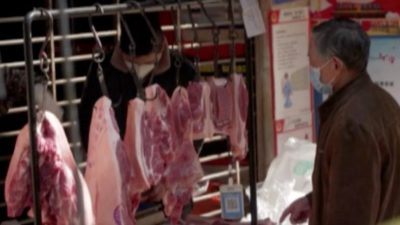
New York and California state lawmakers are calling for a shutdown of all “wet markets” in their states, rolling out new legislation on both coasts to ban the markets—which in China are believed to be linked to the origins of the coronavirus pandemic—for good.
California state Sen. Henry Stern and New York Assemblywoman Linda Rosenthal this week teamed with animal protection legislative advocacy group Social Compassion in Legislation to roll out the plan for their states, which also would cut off imports of exotic and endangered wildlife that could spread “zoonotic” diseases like COVID-19.
Stern and Rosenthal, both Democrats, proposed their legislation after groups of bipartisan lawmakers on Capitol Hill sent letters to the World Health Organization urging it to implement a global ban on live wildlife markets, and the Chinese ambassador to do the same in China.
But these live animal markets don’t just exist abroad—there are dozens in the United States.
In New York City alone—most in the Bronx area—there are more than 80 live-animal markets and slaughterhouses that sell and slaughter a variety of species for human consumption, including goats, sheep, chickens, guinea fowl, turkeys, partridges, rabbits, pigeons and quail, according to the lawmakers. At these markets, the animals are confined in small cages where experts say disease can easily spread—both to other animals and the people at the markets.
“Many live animal markets in New York are filthy places where neighbors complain about unbearable odors and blood and animal feces covering the surrounding public sidewalks and streets. These markets, where live animals are slaughtered on site and sold directly to the public, are breeding grounds for cruelty and disease,” Rosenthal, who represents the district covering the Upper West Side and Hell’s Kitchen in Manhattan, told Fox News.
Rosenthal said inspection reports of the facilities detail “machinery used to kill animals that is caked with thick ‘gunk’ and staff who do not even follow basic sanitary standards, such as wearing gloves while handling dead animals.”
“In addition to the well-documented cruelty to animals, unsanitary conditions like these endanger the health and safety of New Yorkers, and these markets must be closed down,” Rosenthal told Fox News. “The devastation wrought by COVID-19 should serve as a grim warning that live animal markets have no place in today’s society.”
Meanwhile, in California, current law allows amphibians, reptiles and birds to be sold in live animal markets, which they define as retail food markets where, in the regular course of business, animals are stored alive and sold to consumers for the purpose of human consumption.
Stern’s bill would ban imports and sales of live wild animals that pose “zoonotic” disease transmission risk.
“We need to stop the brutal trade in exotic and endangered wildlife once and for all,” Stern said in a statement. “Whether it’s a pangolin being sold for faulty medicine, a white bengal tiger being enslaved for entertainment, or a black rhino ‘trophy’ used to satisfy some misguided hunter‘s ego, California must put an end to wildlife trafficking.”
Despite the bills differing in specific detail, both Stern and Rosenthal agreed that New York and California could “do better to protect public health and the animals trafficked in domestic and international markets.”
Social Compassion in Legislation (SCIL) also told Fox News that their organization is partnering with PETA and WildAid “to help make this a global movement to end these markets.”
“Time is of the essence to do away with the unacceptably cruel status quo which has cast a dark shadow over the entire world through COVID-19,” SCIL founder and president Judie Mancuso said in a statement. “As with our other sponsored legislation, California and New York can be models for the rest of the world.”
Wet markets have become controversial amid the pandemic. In a letter to the World Health Organization last week, Sens. Cory Booker, D-N.J., and Lindsey Graham, R-S.C., and Reps. Mike Quigley, D-Ill., Mike McCaul, R-Texas, and more than 50 other lawmakers called for a global shutdown of the markets, saying they “are believed to be the source of the current COVID-19.”
They went on to note that scientists studying diseases that are zoonotic – meaning they jump between animals and humans – have pointed to the close proximity of shoppers, vendors and both live and dead animals at wet markets in countries around the world “as prime transmission locations for these pathogens.”
They added that “wet markets” pose “a threat to global public health because wildlife comes from many different locations without any standardized sanitary of health inspection processes.”
They also noted that scientists estimate that approximately 60-75 percent of emerging infectious diseases are zoonotic and that approximately 72 percent originate from wildlife.
The calls to ban wet markets come as the positive cases of COVID-19 globally hit nearly 2 million and saw more than 120,900 deaths.
As of Tuesday morning, the United States reported more than 582,500 positive cases of the novel coronavirus and more than 23,600 deaths.
Stay in touch and get the latest WildAid updates.
SIGN UP